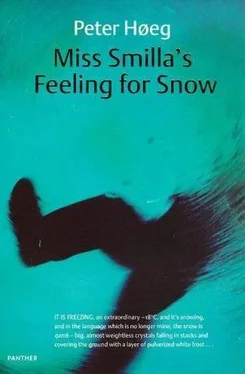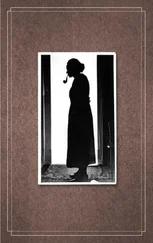Peter Høeg - Smilla's Sense of Snow aka Miss Smilla's Feeling for Snow
Здесь есть возможность читать онлайн «Peter Høeg - Smilla's Sense of Snow aka Miss Smilla's Feeling for Snow» весь текст электронной книги совершенно бесплатно (целиком полную версию без сокращений). В некоторых случаях можно слушать аудио, скачать через торрент в формате fb2 и присутствует краткое содержание. Жанр: Современная проза, на английском языке. Описание произведения, (предисловие) а так же отзывы посетителей доступны на портале библиотеки ЛибКат.
- Название:Smilla's Sense of Snow aka Miss Smilla's Feeling for Snow
- Автор:
- Жанр:
- Год:неизвестен
- ISBN:нет данных
- Рейтинг книги:3 / 5. Голосов: 1
-
Избранное:Добавить в избранное
- Отзывы:
-
Ваша оценка:
- 60
- 1
- 2
- 3
- 4
- 5
Smilla's Sense of Snow aka Miss Smilla's Feeling for Snow: краткое содержание, описание и аннотация
Предлагаем к чтению аннотацию, описание, краткое содержание или предисловие (зависит от того, что написал сам автор книги «Smilla's Sense of Snow aka Miss Smilla's Feeling for Snow»). Если вы не нашли необходимую информацию о книге — напишите в комментариях, мы постараемся отыскать её.
Smilla's Sense of Snow aka Miss Smilla's Feeling for Snow — читать онлайн бесплатно полную книгу (весь текст) целиком
Ниже представлен текст книги, разбитый по страницам. Система сохранения места последней прочитанной страницы, позволяет с удобством читать онлайн бесплатно книгу «Smilla's Sense of Snow aka Miss Smilla's Feeling for Snow», без необходимости каждый раз заново искать на чём Вы остановились. Поставьте закладку, и сможете в любой момент перейти на страницу, на которой закончили чтение.
Интервал:
Закладка:
"What a nice picture this is," I say. "I'm rather interrested in ships myself. When I get home after a long work day among rubber gloves and disinfectants, I put my feet up and leaf through a good book about ships."
Now he's wondering whether I'm deranged.
"We all have our favorites, of course. Mine are the ships that sailed to Greenland. And, as chance will have it, when I saw your name on the fancy nameplate, I said to myself, My God, Smilla, I said. Ving! That nice man who once gave one of your friends a model ship for Christmas. The good ship Johannes Thomsen. To a little Greenlandic boy."
I hang up the picture again. The water wasn't good for it. All cleaning has its price. I think about Juliane, on her knees before him, in the doorway.
"The other thing I never get tired of reading about is ships chartered for expeditions to Greenland."
He's sitting perfectly still now. Only in the reflections of his glasses is there a faint movement.
"For example, the two ships that were chartered in '66 and '91. For the expeditions to Gela Alta."
I go over to the cart and wring out the rag.
"I hope you'll be satisfied now," I say. "We have to move on. Duty calls."
On our way out we can look back through the long series of rooms all the way into his office. He's sitting behind the desk. He hasn't moved.
A middle-aged woman in a white smock is standing at the bottom of the stairs. She's standing there patting her vacuum cleaner, her expression sorrowful. As if she's been discussing how the two of them are going to manage in the big world without that janitor's cart.
The mechanic puts it down in front of her. He's not very happy about taking someone else's equipment. He wants to say a few words. From one working person to another. But he can't think of anything to say.
"We're from the firm," I say. "We've been checking your work. We are very, very satisfied."
I find one of Moritz's spanking new 100-krone bills in my pocket and balance it on the edge of the bucket. "Please accept this bonus. On such a fine morning. To buy a piece of pastry for your coffee."
She looks at me with melancholy eyes.
"I'm the proprietor," she says. "There's only me and four employees."
We stand there a moment, staring at each other, all three of us.
"So what?" I say. "Even proprietors eat pastry with their coffee."
We get into the car and sit there for a while, gazing out across the King's New Square. It's too late for us to eat breakfast together. We agree to meet later. Now that the tension is past, we talk to each other like strangers. After I get out, he rolls down the window.
"Smilla, was that wise?"
"It was an impulse," I say. "And besides, have you ever done any hunting?"
"A little."
"If you're hunting shy animals, like reindeer, you let them catch sight of you a few times on purpose. You stand up and wave the butt of your rifle. In all living creatures, fear and curiosity are closely related in the brain. The deer comes closer. It knows that it's dangerous. But it has to come and see what's moving like that."
"What did you do when it came close?"
"Nothing," I said. "I've never been able to make myself shoot. But maybe you're lucky enough to have someone nearby who knows what has to be done."
I walk home across Knippels Bridge. It's eight o'clock, the day has hardly begun. I feel as if I've accomplished just as much as if I had a paper route.
A letter is waiting for me, a rectangular envelope of heavy stationery. It's from my father. It's a lined envelope from the United Paper Companies with his initials embossed on it. His handwriting looks as if he has taken a course in bragging about himself calligraphically. Which he. has. That was while I was living with him. After two evening classes he had forgotten his old handwriting. And still hadn't learned a new one. After three months he wrote like a child. I had to forge his signature on the bills he sent out. He was afraid his patients would have a relapse when they saw the great medicine man's wobbly signature.
Later it became more controlled. The world admires it. To me it simply seems snobbish.
But the letter is friendly enough. It consists of one line on a piece of paper with a watermark, which I know costs five kroner per sheet. And a bunch of photocopies of newspaper clippings, held together with a paper clip.
"Dear Smilla," it says. "Here's what Berlingske Tidende's archives had on Loyen and Greenland." There is one more sheet.
"A complete list of his scientific publications," it says in Moritz's handwriting. The list is typed.
Underneath it says that the information is from something called Index Medicus, acquired from a database in Stockholm. There are articles in four languages, including Russian. Most of them are in English. I can't even understand the titles of half of them. But Moritz has added a brief explanation in the margin. There are articles on crash injuries. On toxicology. A co-authored article on the difficulties in assimilation of vitamin B12 by the stomach as a complication of gunshot wounds. They're from the forties and fifties. In the sixties the articles start dealirig with Arctic medicine. Trichinosis, frostbite. A book about influenza epidemics around the Barents Sea. There is a long list of shorter articles on parasites. Many on the use of X-rays. His work has been multifaceted.
It looks as if he has done historical research on several occasions. There's an article on the examination of the Iron Age bog people. And there are three articles I put a check mark next to. They deal with the examination of mummies by X-ray. One of them was carried out in Berlin in the seventies, at the Pergamon Museum, on mummies from Tutankhamen's tomb. The second one deals with pre-Buddhist embalming methods in Malaysia and Thailand, published by a museum in Singapore. The third is a treatise on the Greenlandic Qilakitsoq mummies.
At the bottom of the list I write: "With thanks, Smilla," put it in an envelope, and address it to my father. Then I go through the clippings.
There are eighteen of them, and they're in chronological order. I start with the most recent. There's an article from October, announcing that preparations are now nearly complete for the establishment of a forensic medical office for Greenland under the leadership of Professor Johannes Loyen, M.D. The next one is from a year earlier. There's a photo with a brief caption: "The ethics council at the conference in Godthåb." Wearing kamiks and fur hats. Loyen is second from the left. He towers as high as those standing behind him a couple of steps up. The next one is from his seventieth birthday the year before. The text says that due to his work with an autopsy center for Greenland, they have made an exception and extended his tenure. The articles continue this way, backward in time.
"Congratulations on your sixtieth, Professor Loyen."
"Professor Loyen lectures at Greenland's newly opened university."
"Representatives from the board of health in Greenland, Copenhagen's chief medical officer to the left, and chief of staff J. Loyen, head of the newly established Institute for Arctic Medicine."
And so on, backward through the seventies and sixties. The expeditions of '91 and '66 are not mentioned.
The next-to-last clipping is from 1949. It's a little piece of verbal prostitution. An enthusiastic description of the Cryolite Corporation of Denmark's new dumpsters, which have eased the transport of ore from the deeper sections of the quarry up to the earth's surface: A heartfelt tribute to Councilor Ebel and his wife, who are pictured in front. Behind stand chief engineer Dr. Wilhelm Ottesen and the corporation's medical consultant, Dr. Johannes Loyen. The photo was taken at the quarry in Saqqaq, at the moment when the new machines brought the first load to the surface.
Читать дальшеИнтервал:
Закладка:
Похожие книги на «Smilla's Sense of Snow aka Miss Smilla's Feeling for Snow»
Представляем Вашему вниманию похожие книги на «Smilla's Sense of Snow aka Miss Smilla's Feeling for Snow» списком для выбора. Мы отобрали схожую по названию и смыслу литературу в надежде предоставить читателям больше вариантов отыскать новые, интересные, ещё непрочитанные произведения.
Обсуждение, отзывы о книге «Smilla's Sense of Snow aka Miss Smilla's Feeling for Snow» и просто собственные мнения читателей. Оставьте ваши комментарии, напишите, что Вы думаете о произведении, его смысле или главных героях. Укажите что конкретно понравилось, а что нет, и почему Вы так считаете.




![Рута Шепетис - Ashes in the Snow [aka Between Shades of Gray]](/books/414915/ruta-shepetis-ashes-in-the-snow-aka-between-shades-thumb.webp)







